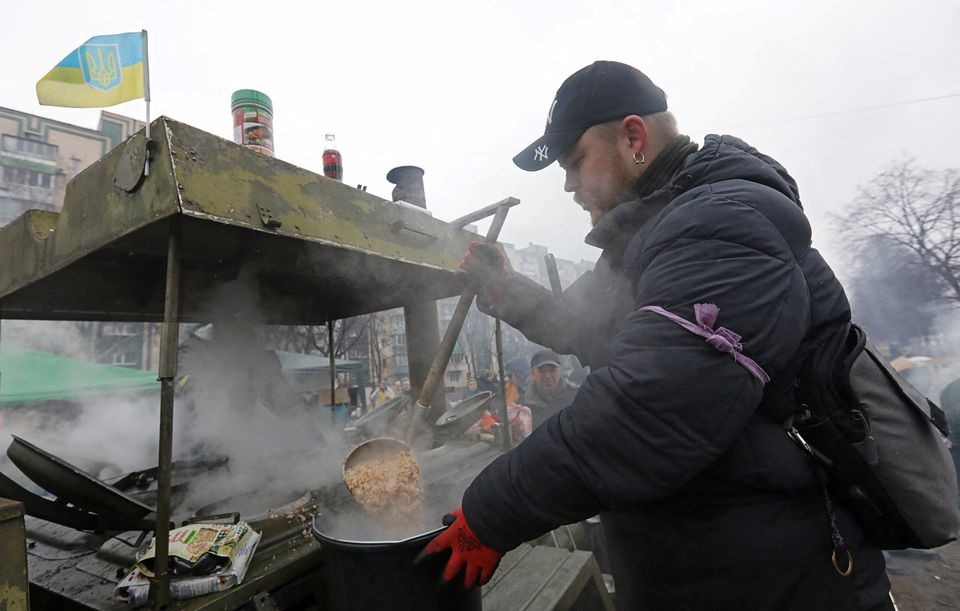Popular Reads
Top Results
Can't find what you're looking for?
View all search resultsPopular Reads
Top Results
Can't find what you're looking for?
View all search resultsWhy Russia must not weaponize hunger
The end of the Black Sea Initiative will lead to a significant reduction in the amount of grain that reaches the people most in need
Change text size
Gift Premium Articles
to Anyone
O
n July 17, Russia refused to renew agreements that allow grain exports through the Black Sea. With this unilateral decision, Russia chose to end a United Nations initiative that was supported by the international community, and which benefited many vulnerable countries and enabled the World Food Programme (WFP) to feed thousands of people in need in Djibouti, Kenya, Ethiopia, Somalia, Sudan and Yemen.
It is the most vulnerable countries, which already bear the brunt of the consequences of the war in Ukraine, that will pay the heaviest price following the abrupt termination of these agreements. Russia’s decision is irresponsible, considering that 2022 was a terrible year for food security. According to the UN, 735 million people worldwide face hunger, with one in five people in Africa affected.
The facts are indisputable.
The end of the Black Sea Initiative will mean a significant reduction in the volume of grains reaching people who need them most. The agreements enabled 33 million tonnes of food commodities to reach 45 countries per year. Russia announced grain donations of only a few thousand tonnes, a fraction of the humanitarian aid that was provided via the Black Sea by the WFP, without any precise date and limited to a handful of countries. This minimal gesture, clearly made to keep up appearances, fools nobody.
Russia’s abrupt cessation of the agreements will also lead to greater volatility in grain prices. After a record high in March 2022 was caused by the launch of the war of aggression against Ukraine, the Black Sea Initiative enabled food prices to fall by almost a quarter. We hoped that they would keep falling, but instead, prices are currently very high. They faced the highest increase yet on July 19 of this year, and there is a risk that they will rise further in the medium term.
Russia and its agricultural sector benefit from these rising prices, with money flowing in at the expense of the disadvantaged, and with exports, despite what Moscow says, not subject to any sanctions.
In fact, Russia is hoping to set a record. It is building up stocks and harvests in order to sell more, and at higher prices. The rest of the world will suffer from because of this.
Actions speak for themselves.
Ukraine, a country at war, part of whose territory is illegally occupied and whose people are bombarded every day, managed to take action to support global food security. It launched the “Grain from Ukraine” humanitarian initiative to help the most vulnerable countries in Africa and Asia.
In contrast, Russia is deliberately bombing the ports of Odesa, Mykolaiv and Chormonorsk. It is destroying grain silos and firing at civilian ships. In so doing, it has openly violated international law while driving up market grain prices after each attack. Russie is destroying and preventing the transport of reserves that were going to the WFP, and, therefore, to the people who are suffering the most. What are its objectives if not to weaponize food?
In the face of Russia’s weaponization of food, France and its European partners have chosen the path of responsibility and international solidarity. At the national level, France has mobilized over 840 million euros (US$915 million) in food aid over the past year, including almost 250 million euros in emergency aid to help the worst-affected populations.
France contributes to the Solidarity Lanes set up by the European Union, which have enabled the export of more than 38 million tonnes of grain from Ukraine by road, rail and river. While Russia has reduced its contribution to the WFP, France has stepped up its financial and material support to get grain and fertilizers to the countries that need them most.
France will continue its efforts, particularly in October in Paris during the Global Ministerial Meeting of the School Meals Coalition, which is working to ensure that children in developing countries are fed and can go to school, and during the next Nutrition for Growth Summit, which France will be hosting.
Paris was also the venue of the Summit for a New Global Financing Pact, held on June 22-23, which generated momentum for solidarity with developing countries in the face of poverty and climate change.
France will work tirelessly, along with its partners, to ensure that those who need food the most can eat. We, at least, will remain true to our principles.
***
The writer is the French minister for Europe and foreign affairs.










